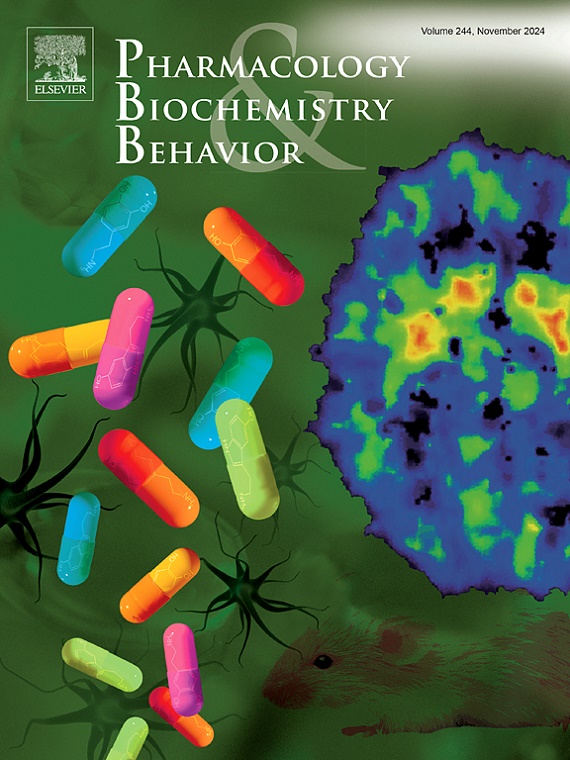Caffeine intake during gestation and lactation causes long-term behavioral impairments in heterogenic mice offspring in a sex-dependent manner
IF 2.5
3区 心理学
Q1 BEHAVIORAL SCIENCES
引用次数: 0
Abstract
Growing evidence has indicated a potential association between maternal consumption of caffeine and impaired cognition and behavior in rodent offspring. However, potential sex differences, as well as caffeine-related effects in subsequent generations are still poorly investigated. We aimed to investigate the impact of pre-and/or neonatal exposition to caffeine on the neurodevelopment of male and female mice offspring. Adult female Swiss mice were randomly divided into four experimental groups, which received, via gavage, water or caffeine (120 mg/day). Control/control (CC) received water during pregnancy and lactation; treated/control (TC): received caffeine during pregnancy and water during lactation; control/treated (CT): received water during pregnancy and caffeine during lactation; treated/treated (TT): received caffeine during pregnancy and lactation. Dams were euthanized at gestational day 17.5 and fetal brains were collected. Adult mice of F1 and F2 generations were submitted to behavioral analysis and their pre-frontal cortex and hippocampi were dissected to measure the levels of BDNF and CX3CL1. Caffeine induced reduction of CX3CL1 levels in female fetuses compared with controls. Maternal intake of caffeine was associated with anxiety- and compulsive-like behavior in both F1 and F2 female mice offspring. Interestingly, only F2 female mice exhibited caffeine-induced impairment of work memory. Hippocampal levels of CX3CL1 and BDNF were decreased in female F1TT and F2TT groups; while among males exposed to caffeine, only F1 offspring had reduced hippocampal CX3CL1 levels. Our results suggest that both pre- and neonatal exposition to caffeine lead to long-term behavioral and neurochemical impairments in a sex-dependent manner, adversely affecting the subsequent female generation.
妊娠期和哺乳期摄入咖啡因会导致异源小鼠后代的长期行为障碍。
越来越多的证据表明,母体摄入咖啡因与啮齿动物后代的认知和行为受损之间存在潜在联系。然而,潜在的性别差异,以及咖啡因对后代的影响,研究仍然很少。我们的目的是调查前和/或新生儿接触咖啡因对雄性和雌性小鼠后代神经发育的影响。将成年瑞士雌性小鼠随机分为4个实验组,分别给予水或咖啡因(120 mg/天)灌胃。对照组/对照组(CC)在妊娠期和哺乳期饮水;实验组/对照组(TC):在怀孕期间摄入咖啡因,在哺乳期摄入水;对照组/实验组(CT):在怀孕期间喝水,在哺乳期摄入咖啡因;治疗/治疗(TT):在怀孕和哺乳期接受咖啡因。在妊娠17.5天对母鼠实施安乐死,并收集胎儿脑。对F1和F2代成年小鼠进行行为分析,并解剖其前额叶皮层和海马,测量BDNF和CX3CL1的水平。与对照组相比,咖啡因诱导雌性胎儿CX3CL1水平降低。在F1和F2雌性小鼠的后代中,母体摄入咖啡因与焦虑和强迫行为有关。有趣的是,只有F2只雌性小鼠表现出咖啡因引起的工作记忆损伤。女性F1TT和F2TT组海马CX3CL1和BDNF水平降低;而在接触咖啡因的雄性中,只有F1后代的海马CX3CL1水平降低。我们的研究结果表明,产前和新生儿接触咖啡因都会导致性别依赖的长期行为和神经化学损伤,对后代的雌性后代产生不利影响。
本文章由计算机程序翻译,如有差异,请以英文原文为准。
求助全文
约1分钟内获得全文
求助全文
来源期刊
CiteScore
6.40
自引率
2.80%
发文量
122
审稿时长
38 days
期刊介绍:
Pharmacology Biochemistry & Behavior publishes original reports in the areas of pharmacology and biochemistry in which the primary emphasis and theoretical context are behavioral. Contributions may involve clinical, preclinical, or basic research. Purely biochemical or toxicology studies will not be published. Papers describing the behavioral effects of novel drugs in models of psychiatric, neurological and cognitive disorders, and central pain must include a positive control unless the paper is on a disease where such a drug is not available yet. Papers focusing on physiological processes (e.g., peripheral pain mechanisms, body temperature regulation, seizure activity) are not accepted as we would like to retain the focus of Pharmacology Biochemistry & Behavior on behavior and its interaction with the biochemistry and neurochemistry of the central nervous system. Papers describing the effects of plant materials are generally not considered, unless the active ingredients are studied, the extraction method is well described, the doses tested are known, and clear and definite experimental evidence on the mechanism of action of the active ingredients is provided.

 求助内容:
求助内容: 应助结果提醒方式:
应助结果提醒方式:


